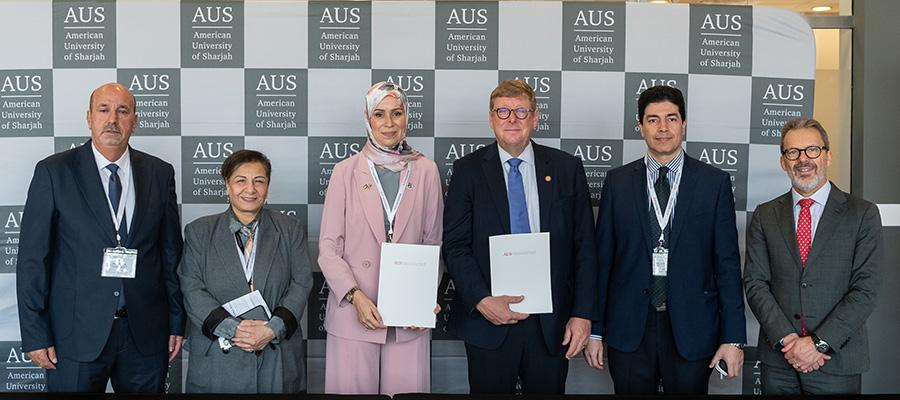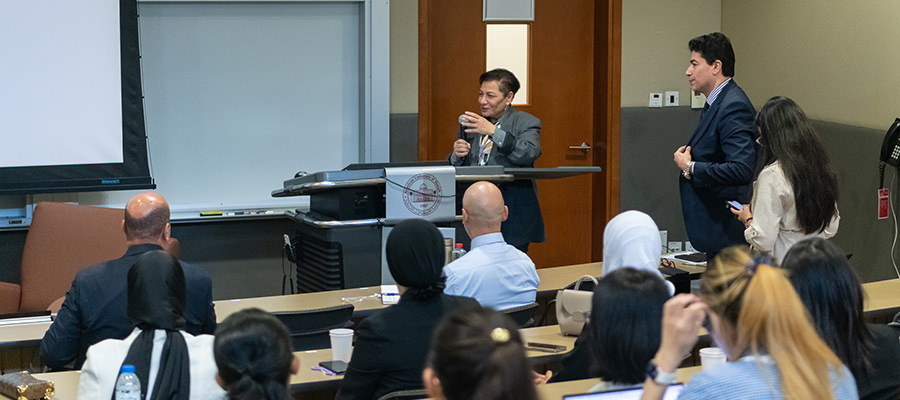- About
- Admissions
- Study at AUS
- Prospective Students
- Bachelor's Degrees
- Master's Degrees
- Doctoral Degrees
- Admission Publications
- International Students
- Contact Admissions
- Grants and Scholarships
- Sponsorship Liaison Services
- Testing Center
- New Undergraduate Student Guide
- Undergraduate Orientation
- New Graduate Student Guide
- Graduate Orientation
- File Completion
- Payment Guide
- Students with Disabilities
- Executive and Continuing Education
- Academics
- Life at AUS
- Research
- Contact Us
- Apply Now
- .

AUS leads regional conversation on the future of sustainable finance and expands partnership with University of Birmingham, UK
American University of Sharjah (AUS) set the regional agenda for conversations on sustainable finance as more than 60 global experts gathered on campus for the Sustainable Finance Innovation Conference (SFIC) from October 30 to November 2, 2025, advancing research, policy and market practice while announcing an international collaboration.
Hosted by the AUS School of Business Administration (SBA) in collaboration with the University of Birmingham’s Institute for Sustainability and Climate Action and Sustainable Financial Innovation Centre, the University of Birmingham Dubai and the UAE–UK Business Council, the conference explored emerging priorities in sustainable finance and future-focused financial systems.
The official program kicked off with introductions from Dr. Narjess Boubakri, Dean of SBA, and Professor Hisham Farag, Professor of Finance and Director of the Sustainable Financial Innovation Centre at the University of Birmingham, followed by welcome remarks from Dr. Tod A. Laursen, Chancellor of AUS, and Dr. Yusra Mouzughi, Provost of the University of Birmingham Dubai.

“SFIC reflects AUS’ role in shaping the global conversation on the future of finance. As markets evolve and sustainability becomes a defining economic force, we are committed to advancing research and preparing leaders who can navigate complexity, innovate responsibly and contribute to a more resilient and equitable financial system,” said Dr. Boubakri.
A keynote by Dr. William L. Megginson of the University of Oklahoma, Professor and Price Chair in Finance at the University of Oklahoma’s Michael F. Price College of Business, explored the financial economics of spaceflight and the ways frontier technologies intersect with long-term investment strategies, risk frameworks and sustainability priorities. He is also Finance Area Editor at the Journal of International Business Studies and a Visiting Professor at the University of International Business and Economics (Beijing).
The program combined plenary discussions with a series of parallel academic sessions that presented new empirical research and policy insights on climate-related financial risk and bank resilience; the influence of corporate governance and disclosure on environmental, social and governance (ESG) performance; green innovation and investment in emerging markets; ESG rating disagreement and greenwashing dynamics; systemic risk in the energy sector; and the expanding application of artificial intelligence, machine learning and FinTech to advance sustainable finance and financial inclusion. These exchanges aligned academic evidence with investable transition pathways and regional sustainability priorities.
The conference featured a panel discussion on carbon capture and storage investment moderated by Bradley Jones, Executive Director, UAE–UK Business Council; with Rohit Balakrishnan, Executive Director, Sustainable, Asset and Project Finance, First Abu Dhabi Bank; Dharmesh Kumar, Director, Business Development – Middle East; and Ricardo and Beena Sharma, CEO and Co-Founder, CCU International.
An address by The Rt Hon. The Lord Udny-Lister, UK Chair, UAE–UK Business Council, highlighted UAE-UK collaboration opportunities in sustainable investment.
A major outcome of the conference was an expanded international collaboration with the University of Birmingham, UK. AUS and the University of Birmingham, UK have formalized a Memorandum of Understanding (MoU) that sets a framework for joint research and co-authored publications, responsible data sharing, faculty and student engagement, innovation-focused workshops and hackathons, business incubation, internships and guest lectures, reciprocal participation in advisory and research steering bodies and coordinated bids for external research funding in the UAE and the UK.
“The MoU sets a practical roadmap for joint action,” said Dr. Osamah AlKhazali, Professor and Head of the Department of Finance and Chair of the Organizing Committee. “By aligning research priorities and creating meaningful pathways for collaboration between AUS and the University of Birmingham, we are laying the foundation for impact-driven initiatives that support the UAE’s long-term financial and sustainable development ambitions.”
“We are delighted to formalise our partnership with AUS through this MoU. This collaboration reflects our shared commitment to advancing academic excellence and fostering innovation across disciplines. Together, we aim to create opportunities that enhance industry engagement, research collaboration and real-world learning experiences for our students, preparing them to lead and contribute meaningfully to the region’s evolving business, engineering, AI and technology landscape,” said Dr. Yusra Mouzughi, Provost of the University of Birmingham Dubai.
The Department of Finance at AUS offers four academic programs: a Bachelor of Science in Business Administration with a Major in Finance, a Master of Science in Finance, a Minor in Finance and a Doctor of Philosophy in Finance, providing a comprehensive pathway from undergraduate study through advanced research and professional preparation. AUS is ranked number one (tied) in the UAE and among the top 250 universities globally for accounting and finance (QS World University Rankings by Narrow Subjects 2025).
To learn more about the department’s offerings, visit www.aus.edu/sba/department-of-finance.

